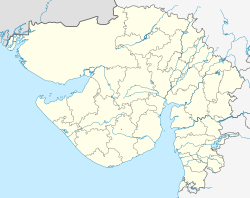Chhota Udaipur
| Chhota Udaipur | |
|---|---|
| City | |
| Location in Gujarat, India | |
| Coordinates: 22°19′12″N 74°0′36″E / 22.32000°N 74.01000°ECoordinates: 22°19′12″N 74°0′36″E / 22.32000°N 74.01000°E | |
| Country |
|
| State | Gujarat |
| District | Chhota Udaipur |
| Population (2001) | |
| • Total | 27,166 |
| Languages | |
| • Official | Gujarati, Hindi |
| Time zone | IST (UTC+5:30) |
| Vehicle registration | GJ |
| Website | gujaratindia |
Chhota Udaipur is a city and a municipality in Chhota Udaipur district in the state of Gujarat, India. It is the headquarters of Chhota Udaipur district.
Chhota Udaipur was the capital of the erstwhile Princely State of Chhota Udaipur, founded in 1743 by Rawal Udeysinhji, a descendant of Patai Rawal of Champaner. This state was a second class state under Rewa Kantha Agency and merged with the Union of India on March 10, 1948.
As of 2001[update] India census, Chhota Udaipur had a population of 27,165. Males constitute 51% of the population and females 49%. Chhota Udaipur has an average literacy rate of 69%, higher than the national average of 59.5%; with male literacy of 76% and female literacy of 62%. 11% of the population is under 6 years of age.
The Kali Niketan (Nahar Mahal) palace, built as the summer residence of the erstwhile royal family is a notable monument in Chhota Udaipur. Chhota Udaipur is also known for the Rathwas in and around the city. The Rathwas are known for Pithora painting, usually carried out on the walls of the village houses. The tribal museum of Chhota Udaipur has a large collection of tribal artefacts. Many tribal artefacts are also brought for sale in the hats (weekly markets) in the city and nearby villages. Industries in largest dolomite lums and powder.
...
Wikipedia


